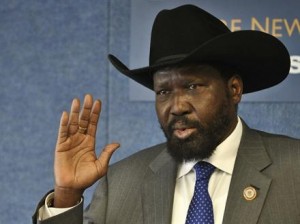Abyei requires global approach, Kiir tells UN envoy
October 17, 2013 (JUBA) – A honest global approach is required for Sudan and South Sudan to amicably resolve their impasse over the disputed region of Abyei, Salva Kiir has told the United Nations special envoy for the two countries.

“The issue of Abyei remains a big challenge not only to our two countries, but also to the international community. We are committed on our side to the full resolution of the final status”, Kiir told the UN special envoy in the capital, Juba.
There is also a need for an honest approach from the international community so that the conflict is resolved amicably at once, he stressed.
At press briefing shortly after his meeting with President Kiir, Menkerios said their discussions mainly focused on the progress so far made in the implementation of last year Cooperation Agreement, which both countries signed in Addis Ababa, Ethiopia.
“I came to meet President Salva Kiir and members of his government on numbers of issues, especially the progress made in the implementation of the cooperation agreement and Abyei. It was a very good meeting. The president briefed about progress which have been made and his commitment to resolving the issue of Abyei”, said the UN special envoy.
Resolving the issue of Abyei is very important because the local people in Abyei feel that results of the discussions do not get implemented, and are becoming more concerns, he added.
Menkerios, however, commended the two countries for showing commitment to fully implement all agreement reached, but urged the two leaders to urgently reach a deal on Abyei referendum vote.
KIIR WRITES TO AU
The meeting between Kiir and the UN envoy comes barely a week after the South Sudan leader wrote to the African Union Commission (AUC), requesting the continental body to take complete responsibility over the impasse between the two countries.
In a letter delivered by the country’s foreign minister, Kiir said he saw no possibility of reaching an understanding with Khartoum over the disputed oil-producing region anytime soon, even if discussions continued for 100 years.
North and South Sudan fought over two decades of civil war, which only ended with the 2005 signing of a peace accord in Kenya.
But under its protocol on Abyei, the people of the contested region should have conducted their referendum at the same time as the people of South Sudan, but it was postponed because of disagreements between the North and South Sudanese leaders.
These differences mainly centred on the eligibility of votes. While the south-governing Sudan Peoples’ Liberation Movement (SPLM) maintained that only the nine Ngok Dinka chiefdoms are eligible to vote as permanent residents of the area, the Khartoum-based National Congress Party (NCP) insisted that the Misseriya Arabs, who are temporary residents, should be allowed to take part in the vote.
(ST)
